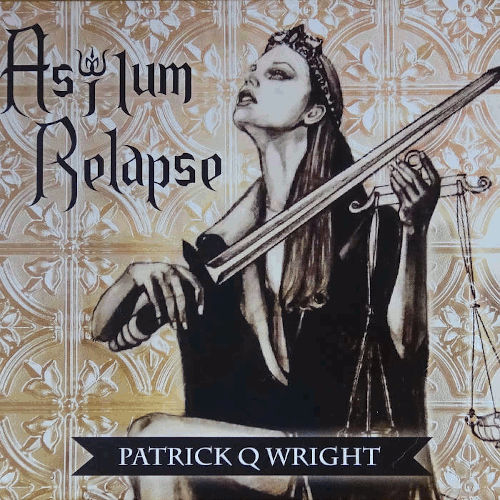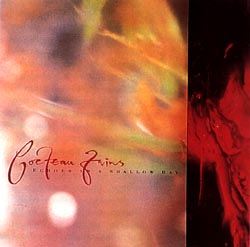Fabriquedecouleurs – Imite Moi
Label: Dorodine Format: CD
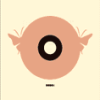 Emmanuel Allard, AKA Fabriquedecouleurs, revels in jagged sounds and digital distortion. At points his music is harsh and distorted, a chaotic barrage of abrasive static crackles and aggressive shortwave squeals. Keyboards pushed to the point where they sound like a guitar feeding back in front of a stack of speakers. At other points it is delicate, silence punctuated by scratches or the gentle bells of Crapaudin that round out the album.
Emmanuel Allard, AKA Fabriquedecouleurs, revels in jagged sounds and digital distortion. At points his music is harsh and distorted, a chaotic barrage of abrasive static crackles and aggressive shortwave squeals. Keyboards pushed to the point where they sound like a guitar feeding back in front of a stack of speakers. At other points it is delicate, silence punctuated by scratches or the gentle bells of Crapaudin that round out the album.
“Pavlonski, Preserver of Form and Balance”, as the title suggests, has a strong sense of structure. Long droning frequencies oscillating against one another are interrupted by clashing colliding noise. The track is given order by this cycle of long drones, interruption, long drones, interruption. Stop, start. Stop, start. Towards the end, when the interruptions gain ascendancy, the music still doesn’t feel arbitrary as the form has been thoroughly established at this point. Elsewhere, on “Benjor”, sounds are pushed to the point where they breaks periodically fizzling out into silence. “Hajime” consists of gentle keyboard noises becoming ever more sharp and distorted which suddenly cut out back to the gentle again. This cycle occurs again and again on Imite Moi, giving structure to the chaotic surface of sound.
The music drifts between the structured and the chaotic, often anarchic but never incoherent. At the same time, order never runs rampant. As the title of “Pavlonski…” suggests, this album is about balance. Balance between chaos and the sheer joy of processed sound and order.
-Alaric Pether-
Family Of God– Atomic Little Thing
Label: Ochre Format: CDS
A peculiar combination of arm-waving, anthemic Pop (with catchy tunes and everything) and subtly barbed lyrics, the title track is a curiously old-fashioned and slightly lateral song which is somewhere between symphonic ballad and ironic (and self-referential) social commentary. As for the remainder of the EP, eclecticism rules, from the pleasant Eastern Transglobalist Ambient progression of “Sabrina” via the very weirdly aquatic Space Rock Disco Opera “Take the Monsters” (sample couplet: “Take away the alien head/Put a butterfly there instead”) to the Clinton-prodding “Electric Bill”, all cheery patter and strangely propulsive clunking.
-Marco Polomint-
Fan Club Orchestra – Sun Papa And The Fan Club Orchestra Vol. 1 & Vol. 2
Label: Sonig Format: CD
Fan Club Orchestra involves more or less ten people playing a variety of instruments: guitar, harmonica, Gameboys, turntables … the list goes on. Laurent Baudoux gives directions via OHP. I’m still not entirely sure where I stand with this CD. The improvised nature of the music gives the sound a real freshness that a thousand post-production tricks will never capture. Sometimes the music languishes around waiting for something to happen, but when it comes together it really comes together. I’m somewhere between saying it’s all right and wow.
Saying something sounds Kraftwerkian is such an overused phrase as to be meaningless these days. So, I’m going to be meaningless and state it here – given a general context of glitchiness and improvisation. There’s something buzzing away through out a great deal of the album that goes back to the antique synths of “Autobahn”. Gameboys perhaps? The tracks on Sun Papa have a fragile unsequenced sound, the drifting layers of sound could all collapse or implode at any second. Sometimes they do, but sometimes the group come together. That’s when spontaneity can’t be beaten.
– Stage 0 –
Perry Farrell – Song Yet To Be Sung
Label: Virgin Format: CD
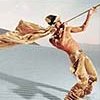 So here it is… the long-awaited debut full studio solo album by one-time God of Rock Perry Farrell, who with Jane’s Addiction made some of the most wonderfully fu(n)cked-up Rock’n’Roll ever, and produced two seminal Metal albums before imploding in a storm of animosity. Then came the underrated Porno for Pyros, which saw Farrell forsaking his opiates for hallucinogens and creating the psychedelic majesty of Good God’s Urge. Then…
So here it is… the long-awaited debut full studio solo album by one-time God of Rock Perry Farrell, who with Jane’s Addiction made some of the most wonderfully fu(n)cked-up Rock’n’Roll ever, and produced two seminal Metal albums before imploding in a storm of animosity. Then came the underrated Porno for Pyros, which saw Farrell forsaking his opiates for hallucinogens and creating the psychedelic majesty of Good God’s Urge. Then…
Then, absolutely fuck all. For, like, ages. A Jane’s Addiction compilation with (gasp) some new stuff on, then… nothing again. Then, as a kind of stopgap half-measure, Rev, a kind of Perry Farrell compilation with (gasp again) some more new stuff on it. Including, astonishingly, a Drum’n’Bass cover of Led Zep‘s “Whole Lotta Love”.
Which brings us up to date, and serves as kind of a blueprint for Song Yet To Be Sung, Farrell’s Drum’n’Bass album. Yup, fer sure. And damn fucking good it is too. You could be forgiven for suspecting this of being bandwagon-jumping of the highest order, were it not for the fact that the music, rhythm and vocals seem to have been created as a whole, rather than just a bunch of songs with some “up-to-date” noises chucked on to shift units. Opener “Happy Birthday Jubilee” sets the tone, all celebratory loveliness and bangin’ breakbeats, before he slows it down a tad for the title track – possibly the best track here – which is kind of a less confrontational cousin of Primal Scream‘s “Kowalski”, that loping bass and BIG sound underpinning an almost-choral electro-devotional hymn from a guy who’s obviously chilled out since the days of “Ted, Just Admit It” and the like.
There’s something almost David Byrne-like to “Did You Forget” (think “Feelings”) before it kicks in with the guitar and the D’n’B. Which kind of sums up the album, really – equal parts chill and exuberance, it’s the perfect accompaniment to what little of summer there is left, even straying into whimsical Reggae (“King Z”) and nearly-Ska (“To Me”) at points, with “King Z” in particular having an evilly infectious riff played on some kind of sampled steel drum (at least, that’s my guess) and an awful lot of lyrics that seem to suggest some kind of psychedelic picnic (I’m assuming his constant references to “cake” aren’t meant in a Chris Morris sense), and, to be honest, it’s the kind I’d love to be invited to. Apparently there’s “fresh bread to eat”, too. Mmm.
Put it this way. If this doesn’t gladden your heart, put a spring in your step, a smile on your face and a big fucking hole in your speakers, then you have no soul.
-Deuteronemu 90210 in a funny hat-
Faultline – Live, March 1999.
Faultline – Closer Colder
Label: Leaf Format: CD,LP
 Closer Colder got me in the middle, right away; something in those words, the choosing to use them of those words, O yeah, 60, are you there? A faultline is a place where the earth is likely to split, crack, go apart in different directions. Faultline is David Kosten and a chosen several accomplices breaking into pieces every kind of music I love and hate. Mirror-opposition in public. Contrast, manic, nothing left to waste; loud, soft, crackle, burn, blaze, still. All this Electronica diced up in the company of grand “real” instruments and sounding like an intelligent future colliding properly with a wise old past, including the contributions of Ian Carr, the extaordinary trumpeter featured on “Mute”. In this distorted atmosphere of stormy synthetics, it seems all ageless when the melancholy Maltese Falcon-sounding trumpet slides in among dripping piano and razorwire drumbeat – and is that a car-engine-choke-grind sample, or am I just glad to see you?
Closer Colder got me in the middle, right away; something in those words, the choosing to use them of those words, O yeah, 60, are you there? A faultline is a place where the earth is likely to split, crack, go apart in different directions. Faultline is David Kosten and a chosen several accomplices breaking into pieces every kind of music I love and hate. Mirror-opposition in public. Contrast, manic, nothing left to waste; loud, soft, crackle, burn, blaze, still. All this Electronica diced up in the company of grand “real” instruments and sounding like an intelligent future colliding properly with a wise old past, including the contributions of Ian Carr, the extaordinary trumpeter featured on “Mute”. In this distorted atmosphere of stormy synthetics, it seems all ageless when the melancholy Maltese Falcon-sounding trumpet slides in among dripping piano and razorwire drumbeat – and is that a car-engine-choke-grind sample, or am I just glad to see you?
This music is blended, perfectly, anything but thrown together, of things which were never meant to be on one slice of plastic, as if Mr. K went about for decades picking up all his favourite things and placing them with loving care into a beautifully gilded and ornamented meat locker for safe keeping. Posh framework for sonic photographs of eras, and crime scenes. To secure the irony, life imitates art and vice-versa; “Control” implements vocals retrieved when a rejected would-be singer leaves death threats on the answering machines at Mr.K’s house and studio. He gets to be a star? Ahhh, but can’t claim credit without also making a criminal confession. His vocals are placed in and around a beautific landscape of sorrowful violins and a comedy Asian-styled xylophone. Ha ha ha, bad singer. Elsewhere, Dennis Hopper‘s voice appears on the title track and is upstaged right off by Kyra Humphreys‘ violin. There is a definitive trade-off between the two; what is lovely, what is terrifying. Another fine meld, gentle keyboards threading through and holding it all in place. More contradiction, more, and more, and more. “Partyline Honey” feels so like what it is about. Who would listen in on a partyline? For just over five minutes, we do. You and me and Sarah indeed. So familiar with car-crash mentality, can’t look away, can’t put the phone down. Then comes the nameless, unmentioned track 9; something for the emperor no doubt.
There is much to love about Closer Colder, except maybe the sticker on the front cover proclaiming from SleazeNation that this will be a “future Mercury Music Prize winner”. I don’t want to hear this music in advertisements for stupid products, and I don’t want to hear this music on radio every other seven seconds. Still, however private collection-oriented Faultline probably should be, the appeal and catch is undeniable, so maybe too many people will like it. And we can’t blame Mr.K for wanting to make a living. I recommend getting this fast, before the public swallows it whole and crucifies it and throws it in the pile with all the other sonic messiahs. And wonder if the future of music really could be this smart.
-LN99-
Faultline – Mute
Label: Fused & Bruised Format: 12″ and CD
 Bringing the muted trumpet (or cornet) of the track’s title to a shuffling, Dubby Drum & Bass track, Faultline work within the tradition of the old-style interplay of Jamaican mixers, producers and melodica players such as the likes of Augustus Pablo or Deadly Headly, as well as the more fashionable Jazz trumpeters. “Mute” is present on the 12″ edition (and CD) in its original guise as a full-length, minutely composed journey across the various sounds of the Twentieth Century’s urban Black music, and as worked over by Si Begg into a bleepy, bass-cycling accompaniment to plangeant, evocative horn sounds. While the mixing of Jazz with D&B is hardly novel, Faultline are pretty good at their splicing of the more emotional sound of the trumpet with the relentlessly shifting bass body, which wriggles and splutters as the more cerebral high notes speak (as they usually do in Jazz) of suffering, as well as redemption.
Bringing the muted trumpet (or cornet) of the track’s title to a shuffling, Dubby Drum & Bass track, Faultline work within the tradition of the old-style interplay of Jamaican mixers, producers and melodica players such as the likes of Augustus Pablo or Deadly Headly, as well as the more fashionable Jazz trumpeters. “Mute” is present on the 12″ edition (and CD) in its original guise as a full-length, minutely composed journey across the various sounds of the Twentieth Century’s urban Black music, and as worked over by Si Begg into a bleepy, bass-cycling accompaniment to plangeant, evocative horn sounds. While the mixing of Jazz with D&B is hardly novel, Faultline are pretty good at their splicing of the more emotional sound of the trumpet with the relentlessly shifting bass body, which wriggles and splutters as the more cerebral high notes speak (as they usually do in Jazz) of suffering, as well as redemption.
When The Third Eye Foundation‘s main man Matt Elliot gets his noisy hands on the track, everything is whirled up into a maelstrom of fractured, distorted beats, topped off with a timestretched variation on the main brass motif which makes for a seriouly pummelling scrape across the margins of breakbeat science, sprawling off into rumbling stomach rhythms and scrawled trumpet glitches. The TEF mix can be found on the CD edition of “Mute,” along with “Dislocate”, which starts off with strings and makes its way rapidly into a ferocious bass-bomb and snare-stretch track which completely sidesteps the problems of cohesion between the apparently disparate sound sources by the simple expedient of working.
-Freq1C-
Faust – interview, October 1998
Fe-mail – Syklubb Fra Haelvete
Label: TV5 Format: LP
My recent conversion to the noises produced by Maja Ratkje led me to this, a further expedition in sound. Here she joins fellow Spunk person Hild Sofie Tafjord . This time they are keen to indulge in another leisure pursuit, sewing, as the title says, Sewing Club from Hell. The cover shows them looking like theyre all shopped out and ready to sew. To sew for Norway, perhaps. And is this music for sewing ? Absolutely. Although it doesn’t say on the sleeve what instruments are used it could be the sound of a million needles driven into unyielding fabric, amplified, ripped apart, sampled and reassembled to produce a garment that may well be worn by the incumbents of Stygian sewing circles. The sound could easily incinerate the wallpaper and cause furniture to melt.
At other times you could hear a pin drop, perhaps more like an avalanche of pins or a tempest of small sharp metals. In a couple of places they allow a few moments reflection, no doubt to consider crochet or cross-stitch. For example, “Water Music” drips and plops and has little chimes surfacing like bubbles through the electronic stream. But they are soon off again on the almost relentless drive for the perfect backdrop to an evening of furious threading and weaving with like-minded seamstresses. And what better way to end than with “A Merry Day In The Woods” where unfortunately our little club is inexplicably ambushed and massacred as wave after wave of sonic brutality wipes them out.
Again it is a limited edition and vinyl is the medium of choice. Pink vinyl. Lovely.
-Paul Donnelly-
Fennesz, O’Rourke, Rehberg – The Magic Sound Of Fenn O’Berg
Label: Mego Format: CD
 Just about some of the most stimulating electronic Improv music produced to date, The Magic Sound Of Fenn O’Berg was recorded live during Christian Fennesz, Jim O’Rourke and Peter Rehberg‘s trips around Europe and Japan in 1998-9, accompanied by the simplest of musical instruments to transport – their Powerbooks (or maybe it is as the Chicks On Speed-designed collage cover would have it, really a wonder machine with one button after all?). It sounds that these three respected producers/musicians and ardent collaborators have the time of their lives, lined up on stage (or in one case, a raft in Hamburg) like a lecture circuit team about to deliver a hi-tec seminar on the finer nuances of digital improvisation, letting loose a veritable barrage of samples in opposition to both each other and possibly the expectations of what live electronic music can sound like. And this sounds like chaos.
Just about some of the most stimulating electronic Improv music produced to date, The Magic Sound Of Fenn O’Berg was recorded live during Christian Fennesz, Jim O’Rourke and Peter Rehberg‘s trips around Europe and Japan in 1998-9, accompanied by the simplest of musical instruments to transport – their Powerbooks (or maybe it is as the Chicks On Speed-designed collage cover would have it, really a wonder machine with one button after all?). It sounds that these three respected producers/musicians and ardent collaborators have the time of their lives, lined up on stage (or in one case, a raft in Hamburg) like a lecture circuit team about to deliver a hi-tec seminar on the finer nuances of digital improvisation, letting loose a veritable barrage of samples in opposition to both each other and possibly the expectations of what live electronic music can sound like. And this sounds like chaos.
Sounds like, of course, is the operative term. Chaos too, come to think of it, soemtimes of the theoretical kind. For all that this music is semi-prepared in advance, the interaction is based on the premise of limited knowledge of what each constituent part might be composed. Glockenspiels for example, pushme-pullyou pianos put through the mincer, deracinated whammied-guitar distendments, and speech synths intoning on steam-powered oscillating machines (ooh, there’s a nice idea). As with all Improv, the decision not to participate is as important as the moments when everyone piles in with their choicly-cut and pasted found sounds into the melange, and it is a pleasure to report that this paradigm is well in evidence here. It is equally a happy duty to inform that the sustained tracts of noise are both intense and usually well-constrained in duration and effect, though perhaps not always much more than the sum of their crisply crepitant parts.
A feature of the eight pieces selected for the album is the way unconstrained, oversampled sounds, recursive meanders and inconclusive backwaters can emerge as irritations much as they might as presage (and perversely even constitute on occasion) highlights, interspersed infrequently with pedestrian moments such as the fizzled-out symphonic conclusion, which eventually picks up slightly through the judicious application of squitters of effected noise. The hissing buzz and flickering drillings snapped into focus by a sampled beat-’em-up groan, a whining sizzle of liquid Electronica puzzle-boxing loops sashaying into stuttered cello drone with no apparent end in mind, the filtered stutter of percussive loops wending their merry way into a timestretched quagmire – each illustrates the ebbing fabric of the arrangements, foregrounds process, ennevates both positively and negatively. But most often engages successfully, which is the real trick of it. The Magic Sound Of Fenn O’Berg is the final act of selection undertaken over the months of realtime composition and recording, straining the residue of performance into artefact. That it is ultimately rewarding shows the benefit of three exploratory talents; when at its noisy best, it can also be satisfyingly devastating.
-Antron S. Meister-
Fever – Too Bad But True
Label: DHR Format: CD,LP
Combining bassquake synthesis, degenerate HipHop beats and borderline psychotic Raggamuffin raps, Din-S.T. and Paul P.M. are the kind of people who like to fuck with your mind and ears at the same time if the evidence of Too Bad But True is anything to go by. Fever‘s a good choice of name too, as the duo lurch from one raddled break to another, swathed in a cloud of hallucinatory, claustrophobic aural detritus, the half-crazed ramblings of the MC blurred and distorted into half-comprehended rants, and the human voice grist to the sampler’s mill.
There’s little respect shown for any of the accepted modes of breakbeat disruption either – the Funk is broken down, denatured and ungainly, with little time for the Industrial logic of progression by full-frontal musical assault. Instead, there’s a queasy smelting of scratches, sampler noise and bursts of fearsomely unhappy sounds. Like cohort Bomb 20, these guys are happiest when the volume is turned up to eleven and they’ve created the maximum confusion and irreglarity possible – as when “Got To Be” shatters the regular beat into splurges of rhythmic noise before slipping in unearthy wails and wheezing electronic groans. By the time end track “Fever” itself hits, the process has become so thoroughly mashed that very little remains identifiable in a deconstructed sludge of megaphone squark, refracted noise and seething bass.
Does it make sense? When the MC delivers “Who is smuggling what/And who is hangin’ round my brain/Soon I hope to be sane” in “Two Poles”, the stretched links to normality become almost untenable, accompanied by appropriatly dissolving music. Further roughness is inflicted by “Black Around Me,” a soundtrack to a slowly unpeeling mind, with existential doubt layered and eventually dispossessed of normal human speech patterns on top of paralysed sounds of equally uncertain origin. No sound is left untouched for long, and any rhythm which stands still for longer than a few beats ends up quivering with electronic ague, with patches of apparent comprehension swiftly dispatched into timestretched near-Chaos. Like New Kingdom before them, Fever are casualties in the queasy morning after HipHop’s party; sometimes a frightening mess, and quite liable to result in bouts of disoriented nausea.
-Freq1C-
Figment Creeper – Instrumental Karaokee
Label: Dizorder Format: 12″
Aha! Fucked-up TripHopDrum&BassJazzHouseTechno from the far North. Splatters of bass. Smashed ride cymbals getting a good run for their money. Squeaks. All the elements of cut and paste sound mixed into a form of melody familiar from the reverb possibilites of undeground dancefloors, boosted way too loud. Distorted electric pianos. Jazz? Only by a margin of error more commonly associated with NATO fighter-bomber pilots.
Tweeting ambiences get a nod in, submerged under that excoriated sound of metallic-tasting scrawls of noise. It’s not so much as in yer face as down yer blackboard. Shivery-tingling, and those keyboards which populate every nice New Age Techno record from Iceland to Durban get pushed up into the mix so hard they bleed. Well, on “Almost There” they do. On “Figment Theme” they’re back coasting over some hyperactive breakbeats like there was no yesterday, only an enless icy tomorrow. Still, it’s ruff and it tumbles into stepping beats and vocals processed way beyond the elegant melodies of mere vocodering.
“Professor Singalong’s Guide to Instrumental Karaokee” takes several quieter themes and excoriates them neatly on the twin barbs of vinyl-scratch and timestretch loops, making up a virtual guidebook which uses a sampled narrator to point out that Figment Creeper can take the orchestra to pieces and put it back together again. “Finally There” is almost too smooth at it’s start, but has a nasty kick in store for anyone expecting to shake their funky thing in too linear a manner to its dissolute version of vocal TripHop. Sarky.
-Alvis Presidently-
Figure – My Spine Is The Bow That Breaks
Label: Multimood Format: CD
 Soundscapes, soundscapes, soundscapes. What sort of world can it be then, where musicians abandon song structure and offer noise without tradition as fodder for our ears? Perhaps a grim world, perhaps a gallant one. I have no argument here; use the sounds of nature to create the soundtrack of this scabby world. Wind and fear and the scraping irritants of real life and barely let in some melodies of chaos. This is music of air and shadows and music for dark places of someone’s mad imagination. Yours? Mine? And it is all very Gothick.
Soundscapes, soundscapes, soundscapes. What sort of world can it be then, where musicians abandon song structure and offer noise without tradition as fodder for our ears? Perhaps a grim world, perhaps a gallant one. I have no argument here; use the sounds of nature to create the soundtrack of this scabby world. Wind and fear and the scraping irritants of real life and barely let in some melodies of chaos. This is music of air and shadows and music for dark places of someone’s mad imagination. Yours? Mine? And it is all very Gothick.
With its organ grind long low keys, My Spine Is The Bow That Breaks keeps to a Gothic sensation and fits right in among the florid flocks. Creator Brannon Hungness (so that’s what’s going on in Dakota) likens to Diamanda Galás however, where the make-up doesn’t matter one bit. Incredibly slick and professional, this CD tells tales of real thought and serious endeavours. There’s a real nightmare going on in there, a vehicle to cerebral mutilation so far blacker than most death Rock that goes before. With its own embedded guillotine coming down here and there it cuts no noise, but silence. Quiet. A little horror if you add in your own heartbeat, exquisite handling of anticipation, and dread. Unrequited fear in the sudden cut-offs. It is easy to hear that Mr. Hungness has some valid training, and is working towards a masterpiece. Aided by Elliot Sharp and The Morpheus Chamber Orchestra among others, Figure is close to one; just stay on the edge of your seat and see when it surges. In the meantime, listen to the bow break.
-Lilly 2000-
Finery Scrawled – Life Can Be Beautiful EP
Label: Earworm Format: 7″
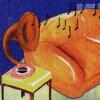 Four oddly affecting songs from the duo of Yann Gafsou and David Freyermouth who are in love with the sound of The Beach Boys (Brian Wilson in particular) and The Zombies, and set out to emulate them in very lo-fi style. Using a selection of xylophones, mouth organs and kazoos as well as the more obvious guitar and bass (which also give a very String Band atmosphere to the instrumental title track), the duo sing odd songs about bittersweet (teenage?) love and rejection, all in close harmony of course and in what can be considered as both retro and ageless style. They really have the whole “does she love me or not?” schtick down pat, and their choice of extraneous instrumentation is admirable, and the suitably reverbed and melodic production is all the better for its four-track sound. Gently nice stuff.
Four oddly affecting songs from the duo of Yann Gafsou and David Freyermouth who are in love with the sound of The Beach Boys (Brian Wilson in particular) and The Zombies, and set out to emulate them in very lo-fi style. Using a selection of xylophones, mouth organs and kazoos as well as the more obvious guitar and bass (which also give a very String Band atmosphere to the instrumental title track), the duo sing odd songs about bittersweet (teenage?) love and rejection, all in close harmony of course and in what can be considered as both retro and ageless style. They really have the whole “does she love me or not?” schtick down pat, and their choice of extraneous instrumentation is admirable, and the suitably reverbed and melodic production is all the better for its four-track sound. Gently nice stuff.
-John Palukha-
Finisterre – Storybook
Label: MoonJune Format: CD
My only contact with Italian Prog Rock had, until recently, been confined to PFM, the grandfathers of the scene, I imagine. That contact ended abruptly when one of my mates said, ‘That sounds like Chicory Tip‘. An unintentional insult, perhaps. They were ‘Pop’ and PFM were ‘Progressive’ i.e. serious musicians. Still, I was never very comfortable with them after that.
Now, donkey’s years later, I find myself listening to two Italian Prog bands in one day. Nostalgia threatens to carry me away, almost. I’m awash in a tidal wave of keyboards, guitars and time changes which were always a sign of ‘serious’ music. I’m also listening to lyrics which I can’t understand, which was often a feature of the genre, even when they weren’t in Italian. Anyway this was recorded as part of the ProgDay Festival in North Carolina during August 1997. ‘ProgDay’, I can hear the sniggers already. They kick off with a Tull-like flute riff, or is it more like that old yodel-meister from Focus. Whatever, it doesn’t last long before we’re into a magnum opus, “Orizzonte Degli Eventi” which is evidently about ‘friendship, love and sssssexxxx’. It opens in a somewhat pastoral mood with acoustic guitar and flute again. The vocals sound very earnest but they are not the strongest feature. The flute leads us again into a passage where a Mellotron glowers over some more rather dramatic vocalising. The piece gathers momentum in true Prog style with tricky drumming figures and a build-up of keyboards and soaring guitar. They remind me of a French band Ange who had a histrionic singer and similar guitar/keyboard leanings.
On “Phaedra” the guitarist Stefano Marelli lets rip, chopping and hacking at a rhythm while pursued by monstrous drumming from Andrea Orlando. It becomes more reflective as he produces those guitar-as-violin effects and some pellucid electric piano and flute weaves and ripples. This is also the track where the band introduce themselves and pay homage to their musical ancestors with riffs from In The Court Of The Crimson King and “Schizoid Man” plus a riff from Genesis circa Selling England By The Pound. I’ll leave you to spot it. Still on the subject of homage, they offer a cover of an old PFM ‘anthem’ “Altaloma” and so bring me a full circle. And they sound nothing like Chicory Tip.
So, a trip down Via Nostalgia for me and, no doubt others. But I’m left wondering where this music can go now. Will it continue to deliver the same formula that seemed new in the 1970s? Or can it, as one of the promo sheets suggests, move “beyond the narrow minded ghetto of its genre” ? Well they have written a Rock opera based on the story of Merlin the Magician….
-Paul Donnelly-
Flex 13 – Paint My Legs
Label: Liquid Format: CD
Starting out somewhere in Blues territory, Pete Hope and Charlie Collins have constructed an album which plunders widely and spreads its influences generously, making a sometimes murky sandwich of samplaphonic fun. The Blues connexion is not to be taken too far as the key ingredient, however – Flex 13 like their Electronica eclectic, and a track like “Trip To The Root” is in watery camel-riding Ambience territory as much as it is in the vicinity of lugubrious shuffling atmospherics.
There’s Jazz in there too, with the kind of edgy English vocals which distort the American Pop idioms of several generations to their own devious, slightly seedy, ever so cynical ends. It’s interesting that they check one of the more outstanding British interpreters of all things Cabaret and drizzly, Pinky MacLure, in their thanks list, and there’s a similar fascination with the faded demi-monde glamour of decadence and madness – see the song “Schizophrenic Lover” for example. Further comparisons could also be made with the wandering dreamscapes of Tarwater, with whom they share a magpie tendency in their sampling, cunning use of sources old and new in their remoulding of uneasy grooves, and an idiosyncratic vocal style which is never afraid of slipping into borrowed texts or even singers as appropriate.
Likewise, the bass-heavy pulse throbs provide a slow, sleazy backbeat for the Nineties; add in rimshots, plucked strings and muted brass samples (with a penchant for the reversed sound as main rhythmic component) and what’s the result? Some downtempo TripHop manouevres, melodic rattles against the background of a rain-redolent sound palette (figuratively if not literally), gloomy but enjoyable, like Film Noir – which is where this wants to be the soundtrack, and no mistake. The stop-start samples owe something to Tricky perhaps (with vinyl noise included, naturally), and the easy sampladelic reconstruction of Delta Blues which makes up “Nuthin'” is preferable to Little Axe’s more groove-oriented excursions in similar territory. Texturally varied, Paint My Legs remains in the back of the mind between listens, which is always a good sign.
-Freq1C-
Flipper – Blow’n Chunks
Label: ROIR Format: CD
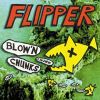 Live at CBGB’s in 83′; that’s like soo Punk Rock…
Live at CBGB’s in 83′; that’s like soo Punk Rock…
Time is a cruel judge. This might have sounded slightly subversive back in the day, but it really doesn’t stand the test of time. If you take a fellow ‘Frisco band like The Dead Kennedys, their material still stands strong after all these years, its creative,intense and extreme. Flipper on the other hand is simply boring and lays bare the inadequacy of the DIY ethic.
On the cover of the CD you have a quote from the post-punk Bible, Trouser Press, ‘A real classic album’… the emperor is clearly naked! The reason I am talking about this is because the music itself is a sleep-inducing drone with some guy yelping about getting drunk, and it bares the hype-fueled inadequacy of Punk. It just pisses me off…
There surely is a passion present here, but the tools to express it are not present. No dynamics, no definition and absolutely no ferocity. Flipper did not rule and still don’t.
-Dag Luterek-
Flossie & The Unicorns – L M N O P
Label: Rhinestone/Skin Graft Format: CD,LP
Seemingly recorded by a group of furry toy animals with a private investigator/veterinarian DJ Cardboard for a singer, LMNOP is Punk Electronica for the under-tens, as expounded on “Free Guitar Lessons For Animals” in which a fluffy bunny, elephant and swamp tiger (among others) are shown three chords and instructed in the rudiments of forming a band, including some pretty nifty sampling and atonal Lo-Fi strumming . However, the wicked witch and carnivore Christy Cornpop is on hand to prevent drummers from playing in the forest to ruin the band’s chance of success.
Needless to say, the struggle to find a drummer involves much conflict with the forces of darkness, squeaky voices and the eventual recruitment of Marshmellow the Squirrel on the drumkit following the witch’s temporary dispatch, and by the end of the first song everything looks promising for the fledgling group. What follows is an ever so slightly demented concept album of electronic noises, elliptical sampling and childlike storytelling, in the tradition of lysergic Seventies television programmes like The Clangers or The Moomintrolls, crossed with the ironic celebrity-obsession of Bongwater and the bizzare stories of Mr. Peppermint. Given the willing suspension of disbelief, LMNOP presents a lateral vision of the mythology of popular music, even taking on board Gothic pantomime in the inventively comic “Halloween Puppet Show” which concludes the story with the requisite triumph of enthusiastic musical ineptitude over the forces of evil.
-Antron S. Meister-
Flowchart – Gee Bee
Label: Endorphin Format: 12″,CDS
 “Gee Bee” is a throbbing, stepping little number based on some minimal beats and some interwoven “bah-bah” samples and recursing digital percussion, swamped over in echo trails in a manner which references both Sterolab and Detroit Techno. Not a bad combination at all, and while deceptively straight-ahead in its four to the floor rhythm, there’s enpough going on under the surface to make the light fantastic a proper dancefloor trip.
“Gee Bee” is a throbbing, stepping little number based on some minimal beats and some interwoven “bah-bah” samples and recursing digital percussion, swamped over in echo trails in a manner which references both Sterolab and Detroit Techno. Not a bad combination at all, and while deceptively straight-ahead in its four to the floor rhythm, there’s enpough going on under the surface to make the light fantastic a proper dancefloor trip.
The b-side track “Mandarine” takes this formula even further into shuffling beat territory, wshing a vaporous mix of glitches over tinkly synth loops and a warbling bass tone. With plenty of space taken to build up the rhythms, it’s even spacier than “Gee Bee”, the urgent beats not really kicking in until the fourth minute, backed up by a flickering melody and some soaring synths and occasional voices from the aether. What’s nice too is the way the repetitive beats move without apparent change under the influence of different layers of sample and analogue, with the old favourite drop-out beats making things ever-so dancefloor friendly.
Tleilaxu‘s mix on the CD release takes things into more conventional breakbeat Techno directions at first, passing a virtual drum machine solo into the bigger bass areas before warbling into ponderous piano echoes and a babel of those machine-ghosted voices.
-Freq1C-
Flowchart – Wishworm
Label: Endorphin Format: CD
 The press sheet sounded promising, “Flowchart love to be unpredictable and are always exploring new sounds, style and direction..” That’s something to live up to. But as far as I can hear there are no new sounds here but a lot of older ones re-hashed. The third track “Ka-Bloom” is monotonous to the point where I wanted to rip my ears off. The formula seems to be : take one idea, add a couple of beats and repeat infinitely. “Fig Newton” is much the same but is marginally more interesting ; an assembly of scratchy electronics, voice samples and what sounds like an intermittent electronic snore. But I kept thinking that if you want to hear this done well you should listen to Faust. There is some promise on “Mmmarch” with organ and random percussion noises opening the track. It develops into a sort of skeletal Reggae rhythm but it’s Reggae with almost all of the basic warmth and humanity removed. I think that is what I dislike about this album – it is a sterile set of soundscapes that are devoid of something human and maybe that’s what they want it to be. For me it’s just too cold and I’m afraid it isn’t new or unpredictable.
The press sheet sounded promising, “Flowchart love to be unpredictable and are always exploring new sounds, style and direction..” That’s something to live up to. But as far as I can hear there are no new sounds here but a lot of older ones re-hashed. The third track “Ka-Bloom” is monotonous to the point where I wanted to rip my ears off. The formula seems to be : take one idea, add a couple of beats and repeat infinitely. “Fig Newton” is much the same but is marginally more interesting ; an assembly of scratchy electronics, voice samples and what sounds like an intermittent electronic snore. But I kept thinking that if you want to hear this done well you should listen to Faust. There is some promise on “Mmmarch” with organ and random percussion noises opening the track. It develops into a sort of skeletal Reggae rhythm but it’s Reggae with almost all of the basic warmth and humanity removed. I think that is what I dislike about this album – it is a sterile set of soundscapes that are devoid of something human and maybe that’s what they want it to be. For me it’s just too cold and I’m afraid it isn’t new or unpredictable.
-Paul Donnelly-
DJ Fluid – Futuretropic (Afro-Brazilian Electronic Beatscapes)
Label: Om Format: CD
 Africa and South America are some of our last frontiers of experimentation. Why should William Bennett and Embryo have all the fun? Soliman Gamil previously had some amount of fun, but he’s dead now. But are those rhythms so immune to experimentation and cross-pollination? Consider this a call – we are distant cousins, even if one relative gets more sex than the other, koff koff…
Africa and South America are some of our last frontiers of experimentation. Why should William Bennett and Embryo have all the fun? Soliman Gamil previously had some amount of fun, but he’s dead now. But are those rhythms so immune to experimentation and cross-pollination? Consider this a call – we are distant cousins, even if one relative gets more sex than the other, koff koff…
The beats flow seamlessly together – a spacesuit for exploring foreign towns. The woman’s voice summons the words, teases them out of the quiet and ashes. Artificial strings vine their way along the breadth of the rhythm and there is a longing now pronounced. But how is it pronounced? What sort of leeway might one have to create within Afro-Brazilian electronic beatscapes?
Movement and longing: the aching, inevitable combination that makes the world go ’round. But is this world really as sad as it seems?
-David Cotner-
The Flying Dutchman – Pathfinder
Label: Tone Casualties Format: CD
 Mixing elements of Trip-Hop and Ambient styles this is a beguiling and spacey journey led by Hanyo van Oosterom, the Flying Dutchman himself. Enlisted as support and fellow travellers are vocalist Ciska Ruitenberg and Edwin de Herder among others. Comparisons, however odious, are inevitable. Jon Hassell-style trumpet voicings can be heard on a couple of tracks and there are hints of Massive Attack and Portishead in other places. I don’t have a problem with this, I’m all in favour of cross-pollination, musically speaking.
Mixing elements of Trip-Hop and Ambient styles this is a beguiling and spacey journey led by Hanyo van Oosterom, the Flying Dutchman himself. Enlisted as support and fellow travellers are vocalist Ciska Ruitenberg and Edwin de Herder among others. Comparisons, however odious, are inevitable. Jon Hassell-style trumpet voicings can be heard on a couple of tracks and there are hints of Massive Attack and Portishead in other places. I don’t have a problem with this, I’m all in favour of cross-pollination, musically speaking.
The Dutchman and his team choose their pieces carefully and construct a mix of live and sampled sound. “One Foot” uses chill, ethereal vocals over electronics, acoustic guitar and a steady pulse to build a dense, hot-house atmosphere. Towards the end the guitar and electronic sounds are more akin to waves breaking on a warm deserted shore. All very ambient and soothing. Not quite the same as “Is Your Heart” which has a faintly menacing ambience created by a slurred bass line and barely audible vocals. The aforementioned breathy trumpet, straight out of Fourth World Music, introduces a sensation of heat, as in a humid, jungle fashion. In keeping with this, “Bring It All Down” takes place in a downpour, driven by acoustic guitar and hand drums. It’s dreamy and drenched waiting for the wind that “will blow us dry”. Hot, steamy sounds also permeate “Pathfinder (part one)” with some more of that trumpet cutting through the tight rhythms.
On the second part of “Pathfinder” the air is thick with malevolent flying creatures until mellow keyboard, distant trumpet and fuzz guitar cut swathes through them. The arrival of the guitar, in particular, is a very welcome sound here. Then on “Underground” the menace re-appears as urgent percussion and a black sky drive the slightly shredded vocals before them, intoning : “A vicious dog appears showing me his teeth”. The paths found throughout this CD may be slightly familiar and comfortable in places, trippy and disturbed in others, but they are all worth following.
-Paul Donnelly-
The Flying Dutchman – Trip To The Core
Label: Tone Casualties Format: CD
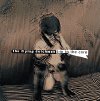 Who remembers Trip-Hop? Oh yeah, it was all the rage back in, oooh, the last century. People (from Bristol, usually) smoking dope and playing slow breakbeats for smokey Jazz clubs. And people with those funny Acid Jazz beards. Then it all got a bit too Hoxton, if you know what I mean, and the market was flooded with tenth-rate Trip-Hop by numbers. Everyone got bored. End of story.
Who remembers Trip-Hop? Oh yeah, it was all the rage back in, oooh, the last century. People (from Bristol, usually) smoking dope and playing slow breakbeats for smokey Jazz clubs. And people with those funny Acid Jazz beards. Then it all got a bit too Hoxton, if you know what I mean, and the market was flooded with tenth-rate Trip-Hop by numbers. Everyone got bored. End of story.
So it was with some trepidation (tripidation?) that I approached this, having been told it was of that ilk. But it’s not half bad. Kind of reminds me why everyone liked the stuff in the first place. And anyway, there’s a lot more variation to it, a lot more than just that Portishead/Tricky/DJ Shadow template (not that I’m dissing any of those, mind, just the tedious twats who set their musical Xeroxes to work on them). Some of it, the opener “Not What It Seems”, for example, is just kind of out-there Electronica. Or “To The Core”, which is just pretty fucked up, like an army of toy soldiers invading Poland. Or “Music, Money, Lawyers”, in which a threatening answerphone message goes all Drum’n’Bass. Of course, there’s the more traditional kind of stuff, too, though even Massive Attack style numbers like “Imaginal Sculpture” have extra cool noises on.
I gather he’s Dutch. And he’s definitely flying. I mean, “Big Iron Whales?” (Vague sense of menace, nice synth washes, whale noises. Very nice.) There’s a touch of the Prog to some of the noises, some of the sense of space. Lots of echoing-out-across-galaxies kind of stuff. You know the deal. Surrealistic European-accented voiceovers, fragments of song. Imagine you’re sitting by a lighthouse. Someone’s turned their foghorn into some kind of musical instrument, and possibly the world’s about to end. But you don’t care, ‘cos you’re really, really caned. I mean, if there was ever an argument for bringing Trip-Hop back, this was it. Although I’m inclined to believe they were lying when they described it thus. Trippy, yes. Trip-Hop? Not really. It’s cool, but not self-consciously so. And that’s what makes it so fucking smart.
-Deuteronemu 90210, The Sitting Englishman-
The Flying Luttenbachers – …The Truth Is A Fucking Lie…
Label: Skin Graft Format: CD
 I like it, but I don’t know what it is. Some kind of spluttering, evil-sounding collection of machines and violins, mangled samples and acrobatic percussion, tortured horns, metallic-sounding thumps and white noise. It’s Free Jazz, it’s Dark Metal (like the stuff from Sveden, yah), it’s performance art, it’s a toaster. It slices, it dices, it’s so dark and angry and painful at times it’s enough to make you run screaming from the torment pouring pouring pouring from your trembling speaker cabinets, it’s gloomy and oppressive and full of beautiful colors, screeching, speeding, suddenly stopping, starting again, an album of pure chaotic dissonance and aural fireworks that has the audacity to call itself “just music.”
I like it, but I don’t know what it is. Some kind of spluttering, evil-sounding collection of machines and violins, mangled samples and acrobatic percussion, tortured horns, metallic-sounding thumps and white noise. It’s Free Jazz, it’s Dark Metal (like the stuff from Sveden, yah), it’s performance art, it’s a toaster. It slices, it dices, it’s so dark and angry and painful at times it’s enough to make you run screaming from the torment pouring pouring pouring from your trembling speaker cabinets, it’s gloomy and oppressive and full of beautiful colors, screeching, speeding, suddenly stopping, starting again, an album of pure chaotic dissonance and aural fireworks that has the audacity to call itself “just music.”
-Holly Day-
Flying Saucer Attack/Main/White Winged Moth – Mort Aux Vaches
Label: Staalplaat Format: CD
For their collective entry in the long-running Mort Aux Vaches radio recordings for VPRO Holland, Flying Saucer Attack, Main and White Winged Moth have provided distinct variations on the theme of guitar music in their own accustomed styles. Dave Pearce (FSA) opts for four treated acoustic miniatures of varying lengths and levels of improvisation, all recorded on 25 Spetember 1997. They’re quite gently pastoral underneath it all, but with some booming overload added post-production, along with electronic birdsong and a swarm of effects kept releatively low down in the mix but to no less effect than some of his fuzz-distortion epics of previous years. It still sounds like Pearce records himself in a rainstorm in other words, though the final track is played bare of pedals and is all the sparser and slightly stranger for it.
Robert Hampson‘s “Counterglow” takes off from his more Isolationist phase as Main into the hard-disc solutions of Electronica, sampling his guitars until the very strings and pickups are barely recognisable in the flurry of whirrs and clicks he constructs out of their bare bones. The mood swings from the rather dry opening into a middle stretch of icy echoes and looming reverse reverberations into a closing flurry of burblings and resampled rustlings and a smooth descent into something a little more harmonious. Dean Roberts follows this with something far less technical, taking the more established format of playing the instrument as a whole device of echo chambers and places to tap and play in all manner of ways other than involving plucking strings and making barre chords. Organic drones make “Scratch(ed) Music” a lengthy piece of hums and still-identifiable twangs and moans, but one which still contrives to move without overly-apparent motion.
What makes this CD all the more collectable and fun however, is the sleeve. This is pre-punched with the pieces to play Mort Aux Vaches, a space combat game for two players in possession of the record, somewhat in the fashion of Battleships. Each spaceship counter (or “Vache”) per player is named after a participating artist identity, with accompanying ship designs executed in wireframe, and is worth points proportionate to the number of tracks per team on the CD. Play proceeds in turns.. and will anyone actually play the game after all, and mess up the limited edition sleeve so comprehensively? Still, a marvellously conceived bit of packaging for an appropriately otherworldly CD.
-Marco Polomint-
Foetus – Flow
Label: Nois-O-Lution Format: CD
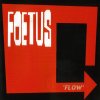 Six years since the last Foetus offering, Flow really doesn’t disappoint those who remember how uniquely inspired some of the earlier, essential releases were. Whilst Gash had its moments (the “Simpsons-inspired” title “Take it outside Godboy!” – “…When you quote the bible is when I load maahh rifle…” and the ultimate Big Band Swing number for times of sexual-rejection, “Slung”) Jim Thirwell‘s usually formidable arranging skills seemed to somehow get lost in the mix, which made for a rather two-dimensional album overall.
Six years since the last Foetus offering, Flow really doesn’t disappoint those who remember how uniquely inspired some of the earlier, essential releases were. Whilst Gash had its moments (the “Simpsons-inspired” title “Take it outside Godboy!” – “…When you quote the bible is when I load maahh rifle…” and the ultimate Big Band Swing number for times of sexual-rejection, “Slung”) Jim Thirwell‘s usually formidable arranging skills seemed to somehow get lost in the mix, which made for a rather two-dimensional album overall.
Recent live performances have also had people asking the question: does the Master of Disaster still have It these days? And the answer is, resoundingly, yes. Flow confounds all expectations and seriously kicks your ass while it’s at it. Opener “Quick Fix” is a typically fierce slab of evil-sounding buzzsaw guitar and apocalyptic keyboards that positively begs to be played at ear-bleeding volume. “Cirrhosis of the Heart” by way of contrast is a cool-as-fuck Jazz/Loungecore piece with swirling Hammond organ and touches of John Barry. “Mandelay” is a slow grind with slave-galley drumming and Ennio Morricone brass. “Grace of God” revisits the dirty Big Band atmosphere of “Slung”, a style which seams to suit his voice perfectly. The percussion in this song simply cannot be denied; it really wants to make you dance. Those handclaps, that glorious Gospel edge, brass heating up in the background. In fact, it’s hard not to imagine lots of people dancing to it.
“Suspect” begins with an eerie Classical score, anxious string-section and a driving rhythm. The urgency of the opening arrangement recalling Jerry Goldsmith‘s excellent Planet Of The Apes score, this is classic Foetus: a symphonic Film Noir nightmare with effortlessly atmospheric narration: “In the shadow of the spectre/Under the sword of Damocles/Well I have got one regret/That I have not killed you yet.” Then there are honest-to-god Pop songs such as “Someone Who Cares” and the defiantly euphoric “Shun”. Absolute stand-out track though is “Heuldoch 7B”, a gloriously toe-tapping, insanely-infectious Industrial-strength Swing number with incisive yet hilariously sleazy lyrics, and a chorus that goes: “C is for contamination/Undergoing litigation/N is not for non-infectious/T’s translating little lectures”. That Jim Thirlwell can set such nihilistic lyrics as, “Look at all the ugly people, diggin’ holes to pass the time, semi-spastic weak and feeble, never-ending pantomime…” to such an uplifting, grin-inducing tune, speaks volumes concerning the playful sense of juxtaposition of style and content that drives this album.
Changing tack yet again, closing track “Kreibabe” offers a genuinely chilling depiction of the descent from innocence into madness. Beginning intimately and quietly, taking in a sampled child’s toybox playing “Hush little baby, don’t you cry,” the track builds over the length of its thirteen minutes through passages of sheer, pounding cacophony before climaxing in an eerily beautiful piece of atonal orchestration. Every track on Flow is perfectly realised, all of the contrasting styles seamlessly melded together and marked with Thirlwell’s guiding fingerprint. The way the instruments and vocals seem to have been recorded slightly too loud makes for a kind of broad, impressionistic brushstroke uniquely his own. If you’re after an album that is simultaneously Industrial, Metal, Loungecore, Big Band and horror-film score, then Flow is your beast…
-Sean Kitching-
Fog – Fog
Label: Ninja Tune Format: CD,LP
“A Word of Advice” sets the tones as pride in accomplishment raises its head and the word “this” is scratched into its own velvet fog over the course of the second song. The cursory aural glance would be to deem this an unusually amicable pairing of turntablism and Indie. Not that the two disciplines (Oi! – Irony Libel Ed.) were ever at odds with one another. It’s just that one kind of music appears on one kind of mixtape, and the other – well, the other generally does not. And with “Pneumonia”, the chill of the spine appears, perfectly enough. Actually, this is rather exceptional, this this this album. The lyrics are included, which is a refreshing change.
And so I marinate inside of “Pneumonia” for a while, and the hot chill keeps crisscrossing my back and there are things that have to be done and reviews to write but all that stops now while the shimmering Pop feeling makes me wait, a mixture of missing-you and missing time.
Now the measured thud and hassle in “Hitting a Wall” segues into the “no, no, no – you don’t understand, it’s not like that at all” of “Fool”, and what else is there to say sometimes other than no no no? “The World’s Greatest Loser”. Now it’s Rock and / or Roll. Sampling Charles Bukowski as well. The turntable is so seamlessly insinuated in some pieces, yet on others takes on the appearance of a flock of exotic birds fluttering amongst choice phrases as “You haven’t really tried something ’til you’ve quit.”
A totally pleasant surprise, this album. Fully and totally.
-David Cotner-
Folkstorm – Victory Or Death
Label: Cold Spring Format: CD
The pulsing thrum of the heady fuck music glow cracks and crumbles beneath a charge of snowstorm static. Scree moves to excoriating – excoriated? – words and then the icy movements of a slayer’s flayer, raising feedback weals with the speeded invisible whipstroke. But victory over what? Against whom? It is not for nothing that Hanoi Hannah addresses US GIs in Vietnam as “adversary” and not as the “enemy”. And, too, the inset photo of the Wotan Clan can be seen as heshers, or hessians. The sounds come fractured, stillborn – snow men, made and destroyed time and again by a restless creator. At lower levels, this fuck music will help plants grow.
The voices vanish in the spiralling fade of sound. A trope on propaganda, now – very educative – is carried in on the front legs of a spider, exploding across the landscape, escaping into the tendons of tinnitus for the short while that it exists. A speech on resistance follows, obscured by the stutter of drumbeats. It wears itself down into oblivion as the rumbling continues, as do the staticked clouds that descend in harpied splendour. A final riposte about social surgery – the expunging the weak from an unknown society in an unseen way. Mysterious and succinct. But just what society amongst societies?
-David Cotner-
Fon – Fakt
Label: Werkzeug Format: CD
Fakt starts of slow and glitchy, then brings up the bass-heavy slow-beats among the virtualized rattle of shaker, whoops of rewound noise, and hiss. Quite a bit of hiss. Those rhtyhms are the knind which tumble around like they’ve got a place to go, but aren’t letting on precisely where that might be. Soon enough, they’ll get there, no doubt.
Fon‘s music here is somewhere in the realms of Electro for glitch-worshippers; the Funk is present, as is the idea of the percussive jam; how pleasing the image is of laptops, goatee beards and joints being passed as the the jams are kicked out in slow motion… but no doubt this is all a fantasy, and Fon is in fact in possession of sensible black clothing and a portable G4 Mac. Such speculation doesn’t really help describe this CD, as it’s both all over the place and directed crisply into quarters occupied by discharges of blippy grooves and sub-bass rumbles, equally messed up into abstract shapes and sinuous meanders.
Lateral beats aplenty, the odd interjection of very heavily treated robo-voices and an ear for the dynamics which are required to make computer music really work are all present and correct on Fakt. So is the slight sense of sterilty to it all; but who can complain when the rhythms are as enjoyably wayward as these?
-Freq1C-
Le Forbici de Manitu – Appy Polly Loggy
Label: Moloko Plus Format: CD
An odd collection of six tracks and a coda from Enrico Marani, Vittore Baroni and the (allegedly) mysterious Manit Rossi, whose name and dream provides the group name, which translates as Manitou’s Scissors. Apparently they’re fans of The Residents‘ as well as Kraftwerk‘s approach to music, and have links with the Association of Autonomous Astronauts too. Well.
What does Appy Polly Loggy sound like then? It’s a large dollop of Drum and Bass overlaid with some pounding Electro rhythms, ominous drones and analogue synthesis. There are some sampled voices talking about mysterious events and unreliable dreams on “Newport Oscillator” among the loping beats and hissy drum machine stabs. Discordant pianos in a very un-Housey-housey manner. Ambient keyboards in a quite accessible manner. Feedback and distended electronic whining and thumping (very Hardbeat); post-Industrial space-out maybe? Some not entirely exploratory hi-hat programming of adequate effect, and pulsed digital bass of transparently basic (but sufficient) format. Handclaps and flanged mid-range scrapes which could be emerging from Gibby Haines‘ nightmares in “Soluble Fly”. Lots more whining to set the teeth on edge, and drum rolls aplenty. Tinkles, regurgitating bleeps and hyperspeed rhythms (“Autonmous Astronaut Astray”) which take off into Drum & Bass motorway cruise by night mode, with traffic cops whistling in glee as they lose control. The “Coda” rounds everything up in Electro style, with the sort of sly shivery echo trails which only computers make possible springing off the machine rhythms. Almost ordinary, really. Almost.
Alright, this CD is really quite strange in places; something about the atmosphere is not quite normal – perhaps they’re having a laugh (with a raised eyebrow)? Or maybe more devious mind-control techniques are being exerted on anyone foolish enough to stick these tracks on a dancefloor. There is evidence of insane intent here, or trickery, or both.
-Freq1C-
Forever Sweet – Don’t Speak
Label: Ladomat 2000 Format: 12″
This is more like it. Forever Sweet have a rough sound (and I don`t mean Ruffneck Bad Bwoy Garage.) The cymbals are raw, the production is pushed that bit further, though I don`t go a bomb on the Justus Kohncke “Abba” remix. I know this is the age of retro and all that, but Abba ammuse me in an ironic way for about five minutes. After that I`m sick of them. Ok, I`m launching into a manifesto here (and temporarily ignoring Forever Sweet). Retro’s all well and good – actually, no it isn`t. Retro pisses me off, it strikes me as being a little uninventive and generally insipid. And Punk never made it back on the retro-bandwagon – that pisses me off too.
Where are all the school kids in Crass and Sex Pistols tee-shirts telling their teachers to fuck off? OK, rant over. Forever Sweet have made a good minimal groovesome record here. My personal fave is their own mix; this has a great insistant quality to it (especially when its played too fast). One point to note: like a lot of non-Chart dance music you probably wouldn`t want to listen to it on its own. It takes it for granted that theres a mix records coming before and after it, but you`d probably expect that anyway, and “Don`t Speak” fits nicely into place.
-Alaric Pether-
Forever Sweet – Geben & Nehmen
Label: Ladomat 2000 Format: CD, 2LP
Geben & Nehmen (Give and Take) is the debut album from Cologne sound setters Michael Mayer, Reinhard Voigt, and Tobias Thomas. Mayer and Voigt are DJs, Thomas is a journalist, publishing the electronic magazine House Attack. The result is rather good Tech/House sampladelic collage. That’s the DJ element at work. An awful lot of samples sound like they have been scooped from vinyl – this is always good for the less obvious sounds. Mellow experimental House mixes with sample loops that conjour up images of tape splicers and scissors in my mind. I can`t really say what they were, and by the time the lads have finished playing with them, most of the samples don`t sound like anything but themselves.
Obscure voices are the best example. “Rave Your Arms” has a sample of a woman saying “You`re looking for a job” (at least that’s what I think she`s saying). It starts to fade in audibly enough, then they give it some nasty filtering, and by the end she could be saying anything your mind suggests. I like this subliminal approach to Techno a lot, and sampling adds more chaos and interference than a synth ever could. The problem with just using synths is that the end result is often squeaky clean. It’s nice to see that they`re not solely concerned with “rockin da floor.” Banging tunes are great in their place, but a whole album of floor fillers tends to get rather samey. Even Mills and Hood can`t sustain the quality through out a whole album, the optimum form for Techno is the 12″ single.
Mayer, Voigt, and Thomas aren`t affraid to play with the technology they`ve got an see what comes out: sometimes it’s beaty, sometimes it’s just plain bizzare: “Zart” is a great example. How much did their macinery have to suffer before it produced a sound like this? Ultimately, this album isn`t going to pack out the big clubs over here, but that’s hardly a criticism. After all, Geben & Nehmen`s quality doesn`t rely on copius amounts of speed or beer. Their debut is well worth a listening in my books.
-Alaric Pether-
Danny Frankel – The Vibration Of Sound
Label: A True Classical CD/Transparency Format: CD
These pieces are collaborations with Woody Jackson, Joseph Hammer, Pablo Calogero, Doug Weiselman, and 11 zebra finches. Drone box stands stolidly behind the tablas and bongos as the tape loops around them, wending their insidious ways as startlingly as the diverse selection of ethnic percussion instruments (ocarina, Egyptian tambourine, electric sitar, cuica, etc.). Boy, that mastering at Capitol sure does help. Apparently Mr. Frankel is a percussionist for such modern-day genii as (it says on the sticker) Luscious Jackson and Fiona Apple. I know it pays the rent, but at this point allow me to point my finger skyward and rotate it in a counter-clockwise fashion.
The morphogenetic field effect is such that these recordings hearkens back to the days of ritualistic experimental music (stretching from the Master Musicians of Jajouka up until Sleep Chamber and Psychick T.V. although it s a bit more upbeat than all that!). This is what can be played to intrigue and captivate your more esoteric belly-dancer girlfriends. It s sweepingly evocative and has a very cinematic, expansive sound to it all. Yet, with the information in the liner notes, is it more tempting to listen to a piece with what instrumentation one might identify and collate, instead of just listening to the piece purely as-is? And now the keening cries of 11 zebra finches speak to the bongos, dumbek, djembe, congra, rattlemallets, metals and Asian chant tape as best they can
To recap: an album that re-summons one particular spirit of modern exotica.
-David Cotner-
Frankie Teardrop – Electro-Acoustic Rollercoaster Ride
Label: Two Ohm Hop Format: 7″
 Ohm member Doug Ferguson conjours up two slices of very spaced-out electronics on this single; pulsing oscillators, drum machine loops, analogue pitchbends and the like making the cycling, warbling shimmer of “Electro-acoustic Rollercoaster Ride” an almost timeless journey along the synthesizer soundscape highway. “Aphrodite’s Lullaby” has more of an ethereal feel, somewhat like the pastoral electronic spaces generated by Hawkwind refugee Harvey Bainbridge a few years back – pleasantly relaxing stuff, though the seven-inch format doesn’t really allow time to sit back and really drift off before the record needs changing – this would be good in a DJ mix though…
Ohm member Doug Ferguson conjours up two slices of very spaced-out electronics on this single; pulsing oscillators, drum machine loops, analogue pitchbends and the like making the cycling, warbling shimmer of “Electro-acoustic Rollercoaster Ride” an almost timeless journey along the synthesizer soundscape highway. “Aphrodite’s Lullaby” has more of an ethereal feel, somewhat like the pastoral electronic spaces generated by Hawkwind refugee Harvey Bainbridge a few years back – pleasantly relaxing stuff, though the seven-inch format doesn’t really allow time to sit back and really drift off before the record needs changing – this would be good in a DJ mix though…
-Antron S. Meister-
FreQ – So, It’s Come To This?
Label: (none) Format: MC
Nope, no connection to this magazine… So, It’s Come To This? is the work of Paul Sellars, also known as Man With No Pseudonym, and is four tracks of breakbeats and Drum & Bass-style smoothness. The opener, “Plan Nine”, adopts a certain spacey vibe, coasting along on synth warbles quite pleasantly, with a marked fondness for rewinds and muted horn samples on top of some modified upright-bass sounds. Birdsong introduces and underpins “Entertainment,” adding to the general aura of pleasant relaxation that accompanies these tracks – which is quite odd, considering the fairly frantic breaks going on here, but it’s still possible, and the rewinds get still more convoluted, to good effect.
“The Picture” and “Meaning?” complete the set with more examples of Sellars’ polished tunes, the former stopping and starting through some whistling synth whoops and scratchy samples, while the latter rounds things off in mellow oboe(?)-sampling style, with another warm bassline to make everything subtly chiled – and even the occasional female “Oooh” vocals are reasonable in this context. All in all, a determinedly easy-going collection, So, It’s Come To This? deserves a far wider release. It probably won’t set many dancefloors alight, but is a remarkably calming record for a Sunday afternoon in the shade.
-Freq1C-
The Frogs – Hopscotch Lollipop Sunday Surprise
Label: Scratchie Format: CD
 Well, they’ve been threatening to do it for years, and it looks like they finally did it: The Frogs have finally put out a record composed almost entirely of love songs. And, while they have been guilty of writing love songs in the past, this is their first collection of songs that touches on, for the most part, “normal” love, and not the gerontophiliac, necrophiliac, or pedophiliac odes that trademarked their earlier albums. Sure, there’s the occasional reference to nipple clamps and the sex/violence paradigm, but for the most part, this is awfully tame.
Well, they’ve been threatening to do it for years, and it looks like they finally did it: The Frogs have finally put out a record composed almost entirely of love songs. And, while they have been guilty of writing love songs in the past, this is their first collection of songs that touches on, for the most part, “normal” love, and not the gerontophiliac, necrophiliac, or pedophiliac odes that trademarked their earlier albums. Sure, there’s the occasional reference to nipple clamps and the sex/violence paradigm, but for the most part, this is awfully tame.
The strength of this album, surprisingly, is the musical arrangements. The opening track, “Whisper,” is beautiful. It is such a pleasant, melancholy, pleading love song it should, in a perfect world, find a spot on every radio station’s regular rotation. The song even features a guest vocal appearance by none other than ex-Skid Row hair Metal hooligan Sebastian Bach. The lyrics themselves are simple and pretty, with lots of vaguely sexual references to flowers and flying and cream – still, completely inoffensive. Another surprising musical coup is the performance of “Bad Daddy.” Against the lyrics concerning incest and offering children to pitbulls is an orchestral backdrop of synth horns, baroque keyboards, acoustic guitars, bells, harmonicas, and glimmery washes that are worthy of Phil Spector. Another track, “Better Than God,” makes its studio debut after being a standard part of the Frogs’ live set for at least the post two tours, and it’s worth the wait. Live, the song is almost comical, performed by a usually inebriated Jimmy Flemion howling the falsetto chorus while brother Dennis beats time on a set of synth drums. On the CD, Jimmy hits all the notes just right, backed by electric guitar fills that sound so much better than the cheesy, staticky guitar that makes its appearance at every show, and what sounds like a full, real percussion kit is utilized.
There are so many styles of music mastered here, from Metal to Folk to Psychedelia, that it almost seems as though this must be material that’s been secretly molding on shelves for years, waiting for the right time to be unleashed on the world, instead of a collection of work done in the short years since their last record came out.
-Holly Day-
The Frogs – Racially Yours
Label: 4 Alarm Records Format: CD
 It’s hard to tell what to think of this. Release of this record was put off for years because various record companies were offended by it, leading to this huge hype build-up surrounded when it was actually going to come out. Like so many other Frogs albums, it’s a concept record – this time, the concept is a bunch of songs about the Black experience, which is a touchy thing for two White guys from the Midwest to muck with in the first place.
It’s hard to tell what to think of this. Release of this record was put off for years because various record companies were offended by it, leading to this huge hype build-up surrounded when it was actually going to come out. Like so many other Frogs albums, it’s a concept record – this time, the concept is a bunch of songs about the Black experience, which is a touchy thing for two White guys from the Midwest to muck with in the first place.
Despite what you and their former labels might think, however, The Frogs manage to make this more offensive to “white” people than “black” people, by directing much rage towards the former – and all its government, religious, and social establishments – because of various injustices done to the latter. The songs are sensitively rendered and performed – on top of that, this is by far the most musical Frogs album yet, with trumpet samples and dreamy synth riffs. I’m probably not getting it, because that happens a lot, but I think this record actually makes for some valuable social commentary.
-Holly Day-
Full Swing – Summer
Label: Orthlong Musork Format: 12″
First thing to notice about “11.55.330” is that maybe the title means it’s eleven minutes fifty-five seconds at 33.3rpm – maybe. 45 seems to suit it just fine though. Pops, crackles and the sound of a radio dial being tuned – or it an oscillator being twiddled. Minimal bass rumblings at a low level, glitches, all that kind of thing, and something like an approaching rhythm of some ominous needle-noise amplified into the digital boost fadeout over noise.
“Summer” (ironically reviewed as the rain pours down in sheets over North London) has that K�n laptop feel to it, meeting up with Berlin minimalism. Stephan Mathieu is from around those part, so no surprises there. Scattered skips from the vinyl are spread around like so much virtual hard disc peanut butter – crunchy of course. Sounds a bit like a close-miked recording of someone’s aesophagous as they swallow some computer breadboards, then the inside of the stomach as it’s digested, but by a cyborg – who else could cope with sush a snack after all? M. Mangetout eats crumbly electronics…
Oh, and one nice thing is the cover, which is reminiscent of Bridget Riley‘s tonal works, like a full colour barcode. Very Modernist, and would look good on the wall, framed.
-Alvis Presidently-
Future Loop Foundation – Daddy Radical
Label: Liquid Format: 12″
A tune that’s bound to go down well next time there’s a street to be reclaimed or a field to be festive in, “Daddy Radical” kicks up a highly twitchy breakbeat storm, with sweeping brass frills and a spray of joyously additive layers of hyperbongo rhythms. That and a chugging speedFunk bass groove, and orchestra stabs and car swerves Yello would be proud of, and Future Loop Foundation have a bit of a stormer on their hands.
The sax interlude even manages to make some kind of sense during the time the “FullLength” mix occupies, while the “Headz Down” version has a punchier feel, dubbing the mix slightly to favour of the percussive elements, but with a few nicely acidic melodies aded to tingle the spine. One for Hardcore beakbeat Techno fans with the Funk and a lot of energy.
-Freq1C-

